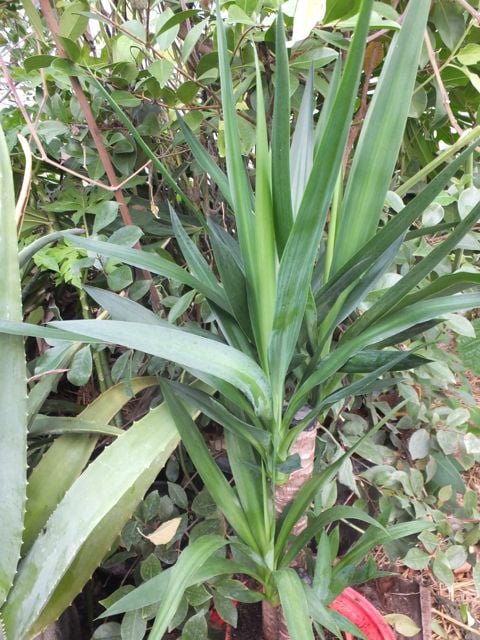An extremely architectural glass-house and house-plant is Yucca elephantipes, the Spineless Yucca or Palm-lily. This is a closely related species to Adam’s Needle (Y. filamentosa), the hardy Yucca of the open garden. Don’t worry the Palm-lily does not have such cruelly pointed leaves. There is still a vestigial point to each but nowhere near as sharp and vicious as ‘needles’ making this a far more acceptable specimen to live with. (Be careful though, sometimes you find the similar but also very sharply pointed Spanish Bayonet Y. aloifolia being offered.)

Only recently adopted as a house-plant the Palm-lily comes from Mexico and the central American region and is well suited to life under cover. Almost hardy and not fussy to compost or conditions this is a born survivor. Most resilient in the face of neglect this plant is almost immune to drought, tolerates the odd water-logging, endures medium even heavy shade and yet also survives parching bright sunlight, and is very seldom ever bothered by pests or diseases.
On the other hand Palm-lilies are not very fast growing. Yet this is an advantage as specimens just take a longer time to outgrow their space. They will eventually become too tall and leggy one day then the solution is simple. You just take a saw and lop the fibrous stem-come-trunk down to a convenient height. New buds and leaves will soon appear near the scar and the plant grows a new top. The old top can be re-rooted for a new plant, as can any side or basal shoots you detach.
In commercial practice because of this tendency to make a tall plant resembling a palm most plants are sold with two or three trunks or stems giving a more balanced shape. All they do is lop tall plants into several logs of different lengths, stand a few of these upright in a pot of compost and before too long a multi-layered plant is ready.
For the collector there are variegated forms as well as the other less benign species. And although essentially an architectural feature maybe one day your plant will be so happy it will flower, these are ivory white and well scented thus the name Palm-lily. It is unlikely you will ever get the possibly edible if unappealing fruit though as a specific moth Pronuba yuccasella is needed.


